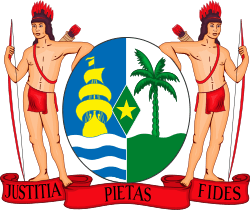1938 Surinamese general election
General elections were held in Suriname on 14 February and 23 March 1938 to choose the ten elected members of the Estates. Grace Schneiders-Howard was the only female candidate and was successful in the second round of voting, becoming the first woman elected in the Surinamese legislature.[1]
 |
|---|
| This article is part of a series on the politics and government of Suriname |
| Constitution |
|
Government |
|
Legislature
|
|
Judiciary |
|
Elections
|
|
|
|
Electoral system
The elections were held using a two-round system in a single nationwide constituency. To be elected in the first round, a candidate had to receive more votes than 50% of the valid ballots cast. If a second round was required the number of candidates was twice the number of seats available. Suffrage was limited to men paying poll tax, although women were allowed to stand as candidates.
Campaign
A total of 22 candidates contested the ten seats.[2] Although not able to vote, a group of creole market women set up the Social Democratic Women's League to campaign for Schneiders-Howard.[1]
Results
Six candidates were elected in the first round, receiving 619 or more votes. A further four were elected in the second. Seven of the winning candidates were incumbent members.[2]
| Candidate | Votes | Notes | |
|---|---|---|---|
| First round |
Second round | ||
| William Kraan | 953 | – | Elected |
| Karel Johannes van Erpecum | 863 | – | Elected |
| Clemens Ramkisoen Biswamitre | 668 | – | Elected |
| Julius del Prado | 773 | – | Elected |
| Frederik Lim A Po | 653 | – | Elected |
| Philip Samson | 644 | – | Elected |
| Gerson Philip Zaal | 607 | 611 | Elected |
| Cornelis William Naar | 560 | 490 | Elected |
| Henry George Willem de Miranda | 543 | 263 | |
| Albert Calor | 445 | 467 | Elected |
| Grace Schneiders-Howard | 442 | 462 | Elected |
| David Jacques Bert Simons | 430 | 351 | |
| Henk van Ommeren | 352 | 374 | |
| C.E. Wolff | 281 | 320 | |
| J.P. Schüngel | 253 | – | |
| J.F.D. Haenen | 265 | – | |
| James Alexander Mac May | 232 | – | |
| C.R. Schoonhoven | 205 | – | |
| J.M.C. Parisius | 195 | – | |
| Th.A.C. Comvalius | 180 | – | |
| Albert Gustaaf Putscher | 149 | – | |
| S. Laret | 132 | – | |
| Valid votes | 1,237 | – | |
Aftermath
Following the elections, five additional members were appointed by the Governor on 30 March:[2] Rachoenandan Brahma Tewari, Nicolaas Cornelis van Gheel Gildemeester, Jagesar Persad Kaulesar Sukul, Hendrik Miskin and Willem Vogel.[3]
Karel Johannes van Erpecum became Chairman of the Estates and Philip Samson vice-president.[3]
References
- Edward Dew (2013) The Difficult Flowering of Surinam: Etnicity and Politics in a Plural Society p53
- Surinaamsch Verslag 1939 p2
- Surinaamsche personalia Surinaamsch verslag